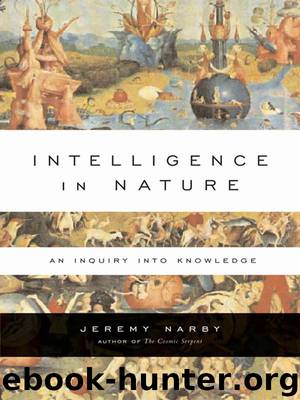Intelligence in Nature by Jeremy Narby

Author:Jeremy Narby
Language: eng
Format: mobi, epub
Tags: Life Sciences, Ecology, Animals, Social Science, Animal Intelligence, Nature, Science, Cognitive Psychology, General, Anthropology, Comparative, Organisms, Miscellanea, Zoology, Psychology
ISBN: 9781585424610
Publisher: Penguin
Published: 2006-03-02T00:00:00+00:00
TRANSFORMERS AND TRANSFORMATION kept cropping up during this investigation. My hunch is that part of natureâs essence is to transform itself, to evolve. The beings of this world seem driven to transform themselves, one way or another. By conducting this investigation, I was transformed. My understanding of science changed. I used to think that scientists were dogmatic, particularly when it comes to considering other species as anything other than machines. Instead I found a broad base of scientists studying biology with open minds.
I also look at living beings with new eyes. Learning that plant cells send one another signals similar to those used by my own neurons, and that plants gauge the world around them and make appropriate decisions, has made me look at all plants, including weeds, with increased respect. And now I admire slime molds, appreciate nematodes, fear Salmonella, and respect cockroaches. And when I drive in the summertime and insects crash into the windshield, I know too much.
Now other species seem more human to me, and humans seem more natural. Recognizing that the capacity to know exists outside humanity leads to a richer, more adventurous, and more comfortable life. Instead of trampling blindly all over the planet, we can see that lifeâs prodigious powers are housed in all its denizens. Chi-sei forms a continuum across the living world.
There does seem to be one difference between contemporary humans and other species: we accumulate our knowledge outside ourselves in artifacts such as written texts. This greatly accelerates the transmission of knowledge, putting us on a learning curve shared by no other species. We acquire and transmit knowledge at an unprecedented rate. But this has given us dominance over most other species, which we are currently abusing by depleting nature at an unsustainable pace. We have yet to learn how to control our predatory nature.
Jaguars set an example on this count. They stand at the top of the Amazonian food chain yet lead discreet lives. As top predators in the rain forest, they can both swim and climb trees with ease; their prey ranges from fish, turtles, and caimans to rodents, deer, and monkeys. These versatile cats often kill their prey by piercing the skull with one swift bite. Their name comes from the Tupi-Guarani word yaguára, meaning âan animal that kills its prey with one bound.â Jaguars have no rivals besides humans, but they tend to hide. In fact, they move around with such stealth that biologists have difficulty studying them. These impeccable predators control their power.
Humanity can learn from nature. This requires coming to terms with the natural worldâs capacity to know. We are a young species, and we are just beginning to understand.
Download
This site does not store any files on its server. We only index and link to content provided by other sites. Please contact the content providers to delete copyright contents if any and email us, we'll remove relevant links or contents immediately.
Becoming Supernatural by Dr. Joe Dispenza(7105)
Tools of Titans by Timothy Ferriss(6946)
The Witchcraft of Salem Village by Shirley Jackson(6584)
Inner Engineering: A Yogi's Guide to Joy by Sadhguru(5895)
The Four Agreements by Don Miguel Ruiz(5511)
The Power of Now: A Guide to Spiritual Enlightenment by Eckhart Tolle(4755)
The Wisdom of Sundays by Oprah Winfrey(4626)
Room 212 by Kate Stewart(4107)
Fear by Osho(4085)
Pale Blue Dot by Carl Sagan(4001)
The David Icke Guide to the Global Conspiracy (and how to end it) by David Icke(3881)
Rising Strong by Brene Brown(3780)
Animal Frequency by Melissa Alvarez(3755)
How to Change Your Mind by Michael Pollan(3676)
Sigil Witchery by Laura Tempest Zakroff(3651)
Real Magic by Dean Radin PhD(3568)
Secrets of Antigravity Propulsion: Tesla, UFOs, and Classified Aerospace Technology by Ph.D. Paul A. Laviolette(3446)
The Art of Happiness by The Dalai Lama(3383)
Man and His Symbols by Carl Gustav Jung(3315)
